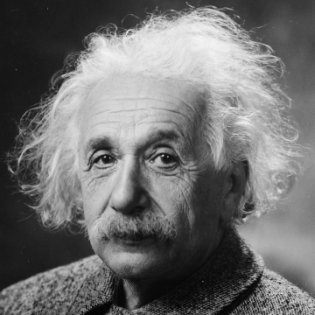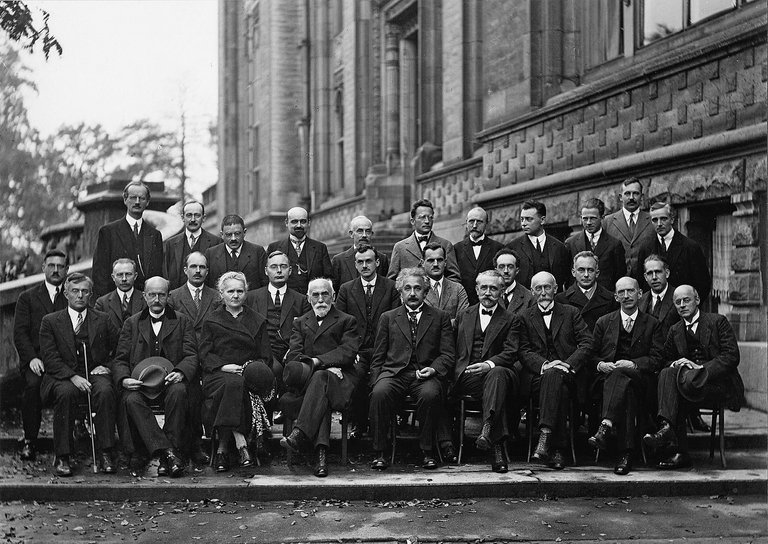
Freewill has been a subject of much debate, in philosophy mainly, but it even found its way into scientific literature.
It was thought at one point that in physics, if we knew enough information about something, then we can calculate and predict exactly what will happen in its future.
In Newton’s laws, if we know the position and velocity of an arrow for example, an arrow or any object pointing at some direction and it's moving at a known speed, you can calculate exactly where it would land after a specific amount of time.
In other words, everything that happens, follows from what has happened earlier.
This all came to a change since the introduction of quantum mechanics.
In quantum mechanics, we can predict only probabilities of an outcome rather than the actual outcomes themselves, in an undeterministic way.
The universe seem to be randomly gambling, or in other words "God seems to be playing dice" in contrast to Einstein's famous saying "God does not play dice with the universe."
Expressing that he didn't fully agree with the quantum physics view of the world, or at least that the theory wasn't complete. He thought the quantum world requires a better explanation for the behavior of its particles.
Bell vs Einstein


Einstein said, quantum mechanics can't be complete, because it has that "spooky action at a distance", he thought quantum mechanics is just an average description of a "hidden variable" theory. In other words, the uncertainties in the quantum theory's predictions were due to our ignorance of these unknown properties.[1]
According to a deterministic point of view, we can't predict the outcome of a quantum measurement because we're simply missing some information.
The missing information is usually referred to as the "hidden variables".[1]
Many scientists tried to prove that Einstein was wrong, including John Bell who actually later refuted Von Neumann’s (a mathematician who seemingly succeeded in proving Einstein was wrong for enough years at least) proof by revealing that it ruled out only a narrow class of hidden-variables theories. And he showed that Einstein’s concerns were valid about locality and incompleteness in the Copenhagen interpretation.[2]
But he wanted physicists to accept that "spooky action", so he had to convince them that an assumption of something called "statistical independence" makes sense.
What's the big deal about spooky action? Well, if such faster than light speed spooky action at a distance exists, then we have to accept that the world is undeterministic, hence we'd have "freewill". Otherwise, everything would be predetermined and we lose that "freewill".
At least that's what Bell made it sound like.
In a 1985 interview on the BBC he said:
There is a way to escape the inference of superluminal speeds and spooky action at a distance. But it involves absolute determinism in the universe, the complete absence of free will. Suppose the world is super-deterministic, with not just inanimate nature running on behind-the-scenes clockwork, but with our behavior, including our belief that we are free to choose to do one experiment rather than another, absolutely predetermined, including the "decision" by the experimenter to carry out one set of measurements rather than another, the difficulty disappears. There is no need for a faster than light signal to tell particle A what measurement has been carried out on particle B, because the universe, including particle A, already "knows" what that measurement, and its outcome, will be.
~ John Bell [4]

Facing those 2 options, accept "spooky action" and keep free will, which would mean bell was right, or reject spooky action but give up free will. Which would mean Einstein was right.
But, did he prove hidden variables are wrong?
What he actually proved is that a hidden variable theory which is;
1. Local
2. Fulfills an obscure assumption called statistical independence.
Must obey an inequality, called bells inequality.[3]
Experimentally, this inequality is violated.
It follows that any hidden variable theory which fits our observations has to violate the statistical independence.
And what this violation means, is that what a quantum particle does, depends on what we measure.
The mathematical assumption of statistical independence has been called the "free will/choice assumption".[3]
Scientists stopped questioning it to the point where many don't even know that bell's theorem requires this additional assumption.[3]
Wasn't bell's argument even flawed, however? Spooky action at a distance shouldn't make any difference for free will.
Because the indeterministic processes in quantum mechanics aren't really influenced by anything, they certainly aren't influenced by our free will whatever that might be.
Superdeterminism

Many Loopholes in Bell's theorem has been patched, but out of his arguments in that BBC interview, the name Superdeterminism sprung out, which was the term he used.
A loophole that seems un-patchable.
The word sounds like it makes something more deterministic than it already is.
But it simply is just plain determinism.
Deterministic models in the normal sense, postulating correlations between what is being measured and the measurement setting.
And I quote from the superdeterminism Wikipedia page:
Bell's theorem assumes that the measurements performed at each detector can be chosen independently of each other and of the hidden variables that determine the measurement outcome. This relation is often referred to as measurement independence or statistical independence. In a superdeterministic theory this relation is not fulfilled; the hidden variables are necessarily correlated with the measurement setting. Since the choice of measurements and the hidden variable are predetermined, the results at one detector can depend on which measurement is done at the other without any need for information to travel faster than the speed of light. The assumption of statistical independence is sometimes referred to as the free choice or free will assumption, since its negation implies that human experimentalists are not free to choose which measurement to perform.
Wikipedia Page
Some physicists and philosophers argued, that if we were to allow it, it would destroy science.
And here's a couple of examples;
Shimony horne clauser thinks doubting statistical independence must be forbidden.
Skepticism of this sort will essentially dismiss all results of scientific experimentation.
~ Shimony horne clauser
epistemological letters 13.1 (1976)
The letters seem to be quite interesting.
Anton Zeilinger, probably one of the most famous physicists alive, says:
We always implicitly assume the freedom of the experimentalist... This fundamental assumption is essential to doing science. If this were not true, then, I suggest, it would make no sense at all to ask nature questions in an experiment, since then nature could determine what our questions are, and that could guide our questions such that we arrive at a false picture of nature.
~Anton Zeilinger
I'm not sure if the question about this issue will ever be solvable, but wouldn't it be bad science to completely throw out determinism just because we don't like its consequences!?

The only issue with superdeterminism is that while it's possible to test some versions of it which posit that correlations between hidden variables and the choice of the measurement have been established in the recent past. It is fundamentally untestable as the correlations can be postulated to have existed since the begining (Big Bang), making both the theory unprovable and the loophole impossible to eliminate at the same time.

Thoughts..
The question about freewill will probably remain unsolved, and it certainly seem to carry a lot to it.
Even the concept that the measurement could depend on what we measure can be an issue by itself.
In the medical arena, for example. Random controlled trials would be impossible if chosing a controlled group could depend on what we will measure later.
Say 2 groups of people were chosen to do an efficiency test of a vaccine, giving one group the vaccine and the other group a placebo instead (that group assignment would be the hidden variable). Then if some of the people in the groups fell ill, you do your tests on them to find out what do they have (that would be the measurement). Now, "If you think what happens to people depends on what measurement you do on them", then you won't be able to draw any conclusions about the efficiency of the vaccine.
But people are not particles, if determinism applies to particles, it doesn't mean it will apply to people too.
I think it doesn't, but I'm not super determined in that regard.

● Thank you for reading ●
● •
1- EPR Paradox | 2- Einstein, Bohr and the war over quantum theory | 3- Bell's theorem | 4- Superdeterminism |





